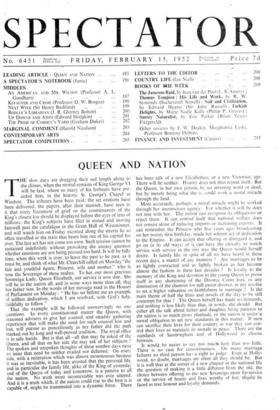QUEEN AND NATION
P-1-1 HE slow days are dragging their sad length along to the climax, when the mortal remains of King George VI will be laid, where so many of his forbears have pre- ceded him, in the historic St. George's Chapel at Windsor. The tributes have been paid; the set orations have been delivered; the papers, after their manner, have seen to it that every lineament of grief on the countenances of the King's closest kin should be displayed before the eyes of tens of millions; the King's subjects have filed in muted and moving farewell past the catafalque in the Great Hall of Westminster. and will watch him on Friday escorted along the streets he so often travelled to the train that bears him out of his capital for ever. The last act has not come too soon. Such tension cannot be sustained indefinitely without provoking the uneasy question whether emotions are not being pressed too hard. It will be fully time, when this week is over, to leave the past to be past, as it must be, and think of what Mr. Churchill called on Monday "the fair and youthful figure, Princess, wife and mother," who is now the Sovereign of these realms. To her, our most gracious Sovereign Lady, Queen Elizabeth, our service is now due. She will be to the nation all, and in some ways more than all, thai her father was. In the words of her message read in the Houses of Parliament on Monday: "He has set before me an example of selfless dedication, which I am resolved, with God's help, faithfully to follow." That the example will be followed unswervingly no one questions. In every constitutional matter the Queen, with seasoned advisers to give her counsel, and steadily gathering experience that will make the need for such counsel less and less, will pursue as punctiliously as her father did the path marked out by long and well-proved tradition. The royal office is in safe hands. But is that all—all that may be asked of the Queen, and all that on her side she may ask of her subjects ? The spoken and unspoken thoughts of these sombre days raise an issue that need be neither evaded nor deferred. On every side, with a reiteration which was almost monotonous because it was so inevitable, it has been attested that the personal life. and in particular the family life, alike of the King of yesterday and of the Queen of today and tomorrow, is a pattern to all the nation. No truth more incontestable was ever uttered. And it is a truth which, if the nation could rise to the best it is capable of, might be transmuted into a dynamic force. There has been talk of a new Elizabethan, or a new Victorian, age. There will be neither. History does not thus repeat itself. But the Queen, in her own person. by no arresting word or deed, but by merely being what she is. could work a moral miracle through the land.
More accurately, perhaps. a moral miracle might be worked through her unconscious agency. For whether it will he does not rest with her. The nation can recognise its obligations or reject them. It can remind itself that national welfare does not consist alone of reducing imports or increasing exports. It can remember the Princess who five years ago, broadcasting on her twenty-first birthday. made her solemn act of dedication to the Empire. It can accept that offering or disregard it, and go on in its old ways; or it can have the chivalry to match service with service in the one way the Queen would herself desire. Is family life, in spite of all we have heard in these recent days, a matter of any moment ? Are marriages to be as lightly contracted and as lightly broken as has become almost the fashion in these last decades ? Is loyalty to the memory of the King and devotion to the young Queen to prove itself in any shortening of the Divorce Court lists, in any diminution of the clamour for still easier divorce, in any resolve to set a higher valuation on faithfulness in marriage '? Is the main theme of half the films and novels of the day to be still contempt for that ? The Queen herself has made no demands, and nothing is less likely than that, in words, she should. But either all the talk about father and daughter being patterns to the nation is so much pious platitude, or the nation is under a moral obligation to set new standards in this matter. If men can sacrifice their lives for their country in war they can con- trol their lives to maintain its morale in peace. There are the standards of Sandringham and of Hollywood to choose between.
It would be easier to say too mucl► here than too little. There is no case for censoriousness. On many marriage failures no third person has a right to judge. Even at Holly- wood, no doubt, marriages are often all they should be. But it is well that at the outset of a new chapter in the national life the question of making it a little different from the old, the choice between offering to the new Sovereign mere lip-service or the service of hearts and lives worthy of her, shguld be faced as true honour and loyalty demands.


























